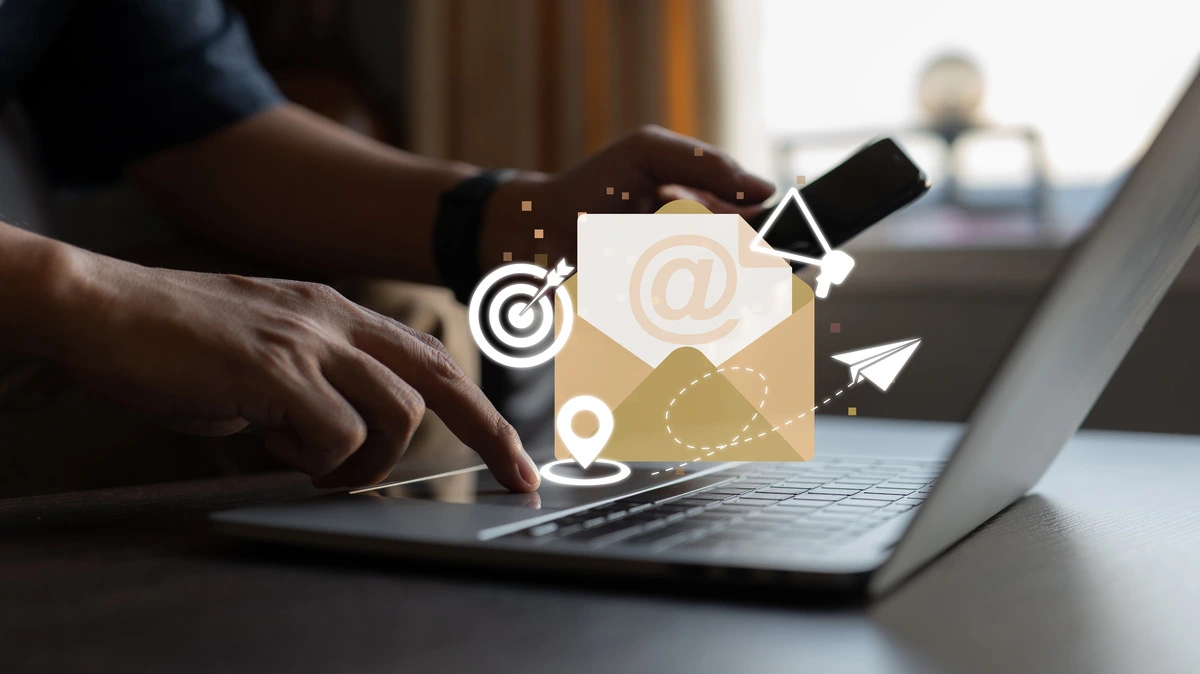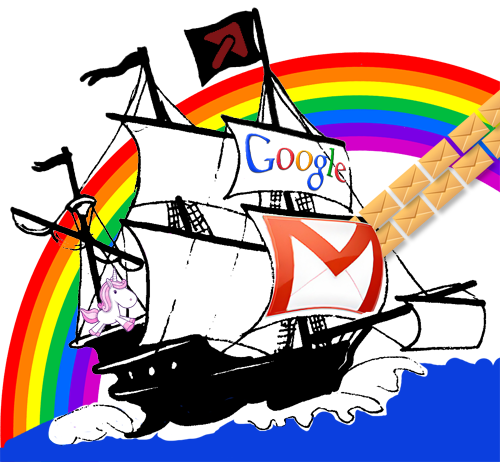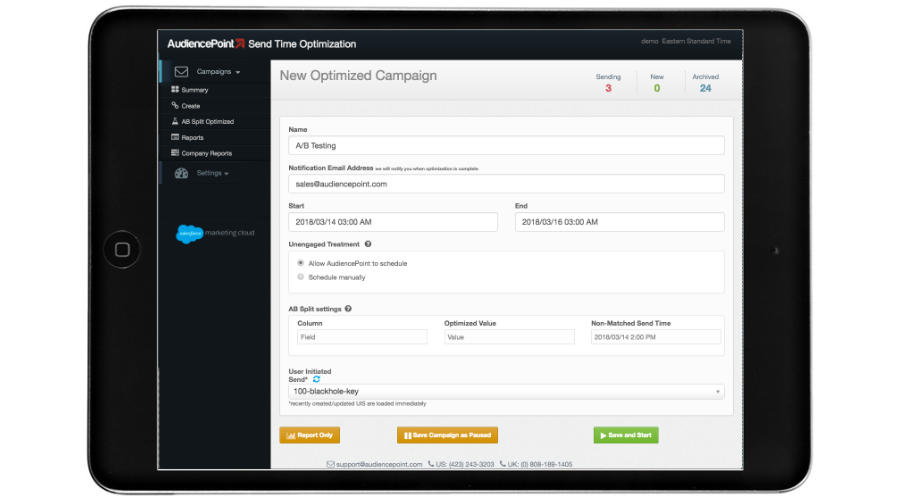AudiencePoint is thrilled to announce our new integration with Klaviyo! AudiencePoint is looking for partners to pilot our...
B2B marketing, or business-to-business marketing, is a strategic approach focused on promoting products and services to other businesses rather than to individual consumers. The core goal of B2B marketing is to build and maintain long-term relationships that provide mutual benefits for both the marketing business and its clients. This approach prioritizes understanding the specific needs and challenges of business clients and offering solutions that align with their strategic goals. Digital marketing is a crucial component in B2B strategies, enhancing online presence and driving customer engagement.
Check out Email marketing trends in 2025!
Overview of B2B Marketing
Successful B2B email marketing efforts hinge on demonstrating measurable value, speaking directly to operational pain points, and showing how your solution accelerates growth for partner organizations. Unlike B2C marketing, which often leverages emotional triggers to appeal to individual consumers, B2B marketing uses detailed, information-rich content that emphasizes efficiencies and email marketing ROI. The process involves a longer sales cycle, numerous decision-makers, and the formation of strong partnerships that bolster trust and reliability. Various marketing channels, including email, social media, and lead generation techniques, play a vital role in optimizing marketing efforts and enhancing overall brand effectiveness.
Distinction Between B2B and B2C Marketing
One critical distinction between B2B and B2C marketing is the audience. B2B marketing typically involves selling to company boards, procurement officers, or managers, whereas B2C marketing targets individual consumers, because purchases often involve multiple stakeholders, nurturing an open customer relationship built on transparency and consultative dialogue is vital for winning trust and keeping deals moving. Moreover, B2B marketing strategies focus on logic and feature-driven content that speaks to the buyer’s immediate business needs and long-term objectives. In B2B contexts, buyers tend to trust authentic, personal interactions over traditional advertising messages, making it essential to leverage internal influencers and create meaningful connections.
Focus on Long-term Relationships
In the B2B sector, success hinges on building meaningful, long-term relationships. Companies often rely on detailed contracts and agreements that define the partnership. This requires marketers to not only meet the existing demands but to anticipate future needs, ensuring continuous engagement and loyalty. This relationship-centric model helps maintain a steady business partnership and provides avenues for upselling and cross-selling opportunities. Regular re engagement campaigns help revive inactive subscribers, ensuring former contacts re enter the conversation and remain aware of new developments they may have missed.
Role of Email Marketing in B2B
Email marketing plays a crucial role in B2B strategies by offering a direct line of communication with key decision-makers. Unlike B2C email approaches that often involve mass blasts and discount-driven content, B2B email marketing focuses on delivering tailored, relevant insights that have significant value for business clients. Tools like AudiencePoint specialize in enhancing B2B email marketing strategies by aiding segmentation and personalization to mirror the unique needs of each business target, fostering deeper connections and supporting longer-term business goals. Leveraging modern email marketing automation lets small teams run enterprise grade nurture streams at scale while still delivering messages that feel personal and timely.
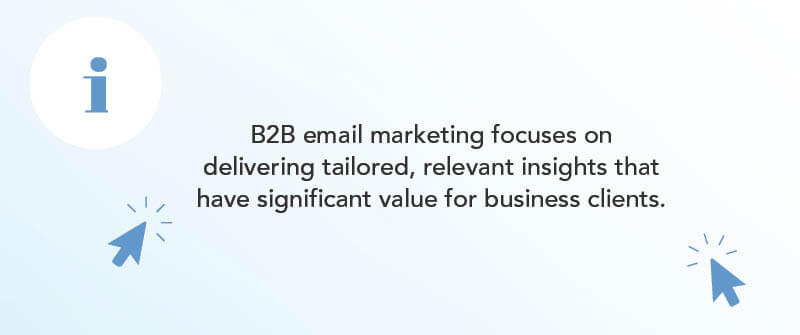
What Is The 80/20 Rule In Email Marketing Strategy?
The 80/20 rule, known as the Pareto Principle, in email marketing serves as a guiding principle for content distribution, ensuring that your communications remain both valuable and engaging to your audience. It suggests that 80% of your email content should focus on providing informative or useful insights, while only 20% should be directly promotional. This balance is critical in maintaining subscriber interest and fostering a positive relationship with your audience. Providing valuable information, such as curated articles, educational resources, or practical tools, is essential to keep your subscribers engaged and enhance their knowledge.
Explanation of the 80/20 Rule
The rule is not arbitrary but rooted in the understanding that consumers are increasingly wary of overtly promotional content. By prioritizing value-driven information, such as industry news, educational content, or expert tips over direct sales pitches, you position your brand as a reliable resource, rather than just another vendor. This shift can significantly bolster trust and engagement. Additionally, sending targeted marketing messages can build relationships and help understand customer preferences.
Application in Content Creation
Implementing the 80/20 rule effectively requires a strategic approach to content creation. Consider creating email segments with a range of materials, such as blog highlights, how-to guides, or case studies, ensuring they are tailored to address the specific interests and pain points of your audience. This not only facilitates deeper engagement but also enhances the perceived credibility of your business. When it comes to the 20% promotional content, use it sparingly and ensure it’s compelling enough to convert without overwhelming your subscribers.
Balancing Promotional Content with Value-Driven Insights
The balance between promotional and informational content is where many marketers find the crux of their strategy. It’s important to maintain a careful mix, so your audience always looks forward to the next email rather than dreading another promotional push. Use analytics to determine what types of content garner the most attention and adjust your strategy accordingly. If informational content results in higher engagement rates or clicks, it might be worthwhile to increase its frequency.
Impact on Engagement, Conversions, and Generate Leads
Adhering to the 80/20 rule doesn’t just increase engagement; it can also lead to higher conversion rates. As your audience begins to see you as a valuable resource, they are more likely to engage with the promotional aspects of your emails. This rule effectively nurtures leads by building a foundation of trust, which is essential for moving prospects through the sales funnel in a non-intrusive manner. Targeted messaging can effectively generate leads and promote engagement with potential clients. Ultimately, a well-executed 80/20 strategy can lead to more meaningful interactions and contribute significantly to your ROI.
With AudiencePoint, you can monitor how well your content aligns with these principles by utilizing comprehensive insights from our email insight software. Our tools will help you find the right balance to optimize engagements and conversions, propelling your email marketing campaigns to new heights.
What Are The 4 C’s Of B2B Marketing?
The 4 C’s of B2B marketing are crucial for understanding how to effectively target and engage with other businesses. They stand for Customer, Cost, Convenience, and Communication. Understanding and connecting with target audiences in B2B email marketing is essential, as successful campaigns must balance professional business objectives with human, emotional elements to engage and resonate with the specific needs and preferences of the audience. These elements form a comprehensive framework that guides marketers in crafting strategies that resonate with their audience. While these principles have broad applications, their integration into email marketing strategies can significantly enhance engagement and conversions.
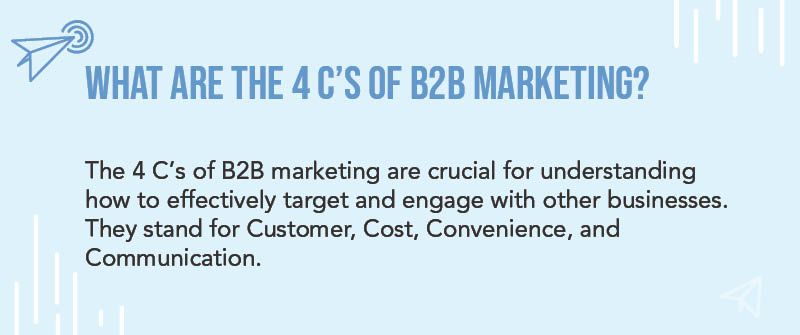
Customer
In the realm of B2B marketing, understanding your customer’s needs is paramount. This involves not only knowing what products or services they require but also their business goals and challenges. By aligning your email content to address these aspects, you can create more compelling messages that resonate with the reader, thereby increasing the likelihood of engagement. Additionally, showcasing value to potential customers through upselling, customer testimonials, and educational content is crucial for building trust and credibility, encouraging these prospects to take action.
Cost
Cost is another critical factor in B2B marketing. Businesses are often more concerned about value and return on investment than the actual price. Therefore, your emails should highlight the benefits and value propositions of your offering, demonstrating how it solves their problems cost-effectively.
Convenience
Convenience in B2B transactions is about simplifying the buying process. Your emails should make it easy for recipients to understand how to proceed to the next steps, whether that’s downloading a whitepaper, setting up a demo, or contacting a sales representative. Clear calls to action (CTAs) are essential in guiding your audience through a convenient pathway to purchase.
Communication
Lastly, communication is about maintaining a dialogue with your audience. Regular and relevant email communications help nurture relationships by keeping your brand top-of-mind. It’s also crucial to manage spam complaints to maintain your email reputation. Emails should be part of an integrated communication strategy that includes personalized content tailored to the lifecycle stages of your customer’s journey.
By applying the 4 C’s effectively in your email marketing strategy, you can ensure that your messages not only reach your audience but also encourage interaction and foster long-term business relationships. This approach underscores the value that AudiencePoint can add by delivering tailored insights and content. It helps businesses ensure their campaigns are aligned with these strategic principles, maximizing their impact and driving tangible results.
Exploring Types Of B2B Email Marketing
B2B marketing encompasses a variety of strategic approaches designed to engage and convert business customers. Understanding the different types of B2B marketing can help you select the right strategy to reach your target audience effectively. The four main types of B2B marketing include product-focused, service-oriented, channel-based, and relationship-driven approaches. Additionally, social media marketing plays a crucial role in building brand awareness and connecting with potential customers early in the buyer’s journey.
Product-focused B2B marketing
This type of marketing targets businesses with products designed to meet their specific needs. It involves highlighting product features, benefits, and technological innovations that set the products apart from competitors. Email marketing can be a powerful tool in product-focused B2B marketing, as it allows you to send detailed product information, industry news, and new feature updates directly to interested buyers, enhancing their understanding and perception of your products. Additionally, email campaigns can provide detailed product information, helping to segment audiences based on target personas and significantly increase revenue.
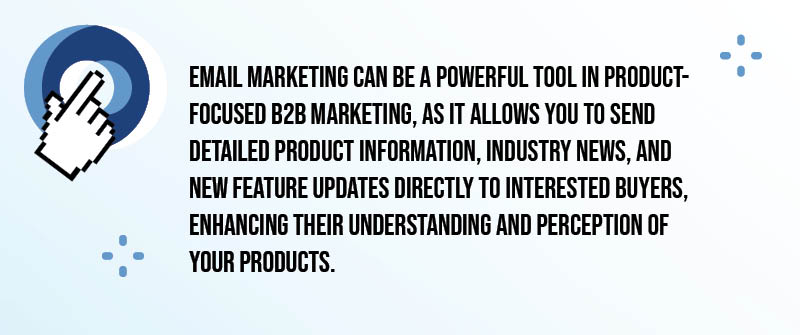
Service-oriented B2B marketing
When the primary offering is a service, B2B marketing strategies must focus on demonstrating expertise, reliability, and the unique advantages of the service provider. Email marketing can be used to share case studies, testimonials, and service updates, showcasing how your services deliver real-world value and addressing pain points specific to your audience. Additionally, email marketing serves as a crucial marketing tool to promote your services effectively, driving lead generation and conversion by improving data quality and enriching the marketing process.
Channel-based B2B marketing
Focusing on various channels through which products or services are distributed, channel-based B2B marketing entails securing partnerships and enhancing distribution networks. Email marketing supports this strategy by maintaining open lines of communication with distributors and partners, sharing critical updates, sales strategies, and joint opportunities to expand market reach.
Relationship-driven B2B marketing
Building strong, enduring relationships with clients is central to this type of B2B marketing. This involves leveraging personalized engagements and maintaining high-value communication. Email marketing plays a crucial role here by facilitating personalized messages, loyalty programs, and continuous engagement ladders that nurture relationships and encourage recurring business. Welcome emails for new subscribers are particularly important as they provide an opportunity to make a positive first impression, educate them about the brand’s offerings, and enhance the onboarding experience, ultimately fostering engagement and retention.
Exploring effective ways to amplify your B2B marketing efforts begins with understanding your unique audience and selecting the best strategies that meet their needs. By integrating comprehensive insights from AudiencePoint, you can refine your approach to ensure your email marketing campaigns deliver impactful results. From enhancing subscriber engagement to streamlining IP warming strategies, AudiencePoint arms you with advanced insights to elevate your email marketing game, maximize revenue potential, and secure a definitive edge over the competition. Contact the AudiencePoint team today!
